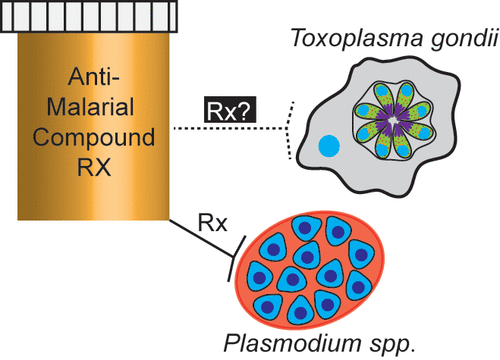当前位置:
X-MOL 学术
›
ACS Infect. Dis.
›
论文详情
Our official English website, www.x-mol.net, welcomes your
feedback! (Note: you will need to create a separate account there.)
Evaluation of Current and Emerging Antimalarial Medicines for Inhibition of Toxoplasma gondii Growth in Vitro
ACS Infectious Diseases ( IF 4.0 ) Pub Date : 2018-07-12 00:00:00 , DOI: 10.1021/acsinfecdis.8b00113 Joshua B Radke 1 , Jeremy N Burrows 2 , Daniel E Goldberg 3 , L David Sibley 1
ACS Infectious Diseases ( IF 4.0 ) Pub Date : 2018-07-12 00:00:00 , DOI: 10.1021/acsinfecdis.8b00113 Joshua B Radke 1 , Jeremy N Burrows 2 , Daniel E Goldberg 3 , L David Sibley 1
Affiliation

|
Toxoplasma gondii is a common zoonotic infection of humans, and estimates indicate that 1–2 billion people are chronically infected. Although largely asymptomatic, chronic infection poses risk of serious disease due to reactivation should immunity decline. Current therapies for toxoplasmosis only control acute infection caused by actively proliferating tachyzoites but do not eradicate the chronic tissue cyst stages. As well, there are considerable adverse side effects of the most commonly used therapy of combined sulfadiazine and pyrimethamine. Targeting the folate pathway is also an effective treatment for malaria, caused by the related parasites Plasmodium spp., suggesting common agents might be used to treat both infections. Here, we evaluated currently approved and newly emerging medicines for malaria to determine if such compounds might also prove useful for treating toxoplasmosis. Surprisingly, the majority of antimalarial compounds being used currently or in development for treatment of malaria were only modestly effective at inhibiting in vitro growth of T. gondii tachyzoites. These findings suggest that many essential processes in P. falciparum that are targeted by antimalarial compounds are either divergent or nonessential in T. gondii, thus limiting options for repurposing of current antimalarial medicines for toxoplasmosis.
中文翻译:

现有和新兴抗疟药物抑制弓形虫生长的体外评价
弓形虫是人类常见的人畜共患感染,估计有 1-20 亿人慢性感染。尽管大部分无症状,但如果免疫力下降,慢性感染会因重新激活而带来严重疾病的风险。目前弓形体病的治疗只能控制由活跃增殖的速殖子引起的急性感染,但不能根除慢性组织囊肿阶段。此外,最常用的磺胺嘧啶和乙胺嘧啶联合疗法也存在相当大的副作用。针对叶酸途径也是治疗疟疾的有效方法,疟疾是由相关寄生虫疟原虫属引起的,这表明常见的药物可用于治疗这两种感染。在这里,我们评估了目前批准的和新兴的疟疾药物,以确定这些化合物是否也可用于治疗弓形体病。令人惊讶的是,目前使用或正在开发的大多数用于治疗疟疾的抗疟化合物在抑制弓形虫速殖子的体外生长方面仅具有适度的效果。这些发现表明,抗疟化合物针对的恶性疟原虫中的许多重要过程在弓形虫中要么是不同的,要么是非必需的,因此限制了现有抗疟药物用于弓形虫病的重新利用的选择。
更新日期:2018-07-12
中文翻译:

现有和新兴抗疟药物抑制弓形虫生长的体外评价
弓形虫是人类常见的人畜共患感染,估计有 1-20 亿人慢性感染。尽管大部分无症状,但如果免疫力下降,慢性感染会因重新激活而带来严重疾病的风险。目前弓形体病的治疗只能控制由活跃增殖的速殖子引起的急性感染,但不能根除慢性组织囊肿阶段。此外,最常用的磺胺嘧啶和乙胺嘧啶联合疗法也存在相当大的副作用。针对叶酸途径也是治疗疟疾的有效方法,疟疾是由相关寄生虫疟原虫属引起的,这表明常见的药物可用于治疗这两种感染。在这里,我们评估了目前批准的和新兴的疟疾药物,以确定这些化合物是否也可用于治疗弓形体病。令人惊讶的是,目前使用或正在开发的大多数用于治疗疟疾的抗疟化合物在抑制弓形虫速殖子的体外生长方面仅具有适度的效果。这些发现表明,抗疟化合物针对的恶性疟原虫中的许多重要过程在弓形虫中要么是不同的,要么是非必需的,因此限制了现有抗疟药物用于弓形虫病的重新利用的选择。











































 京公网安备 11010802027423号
京公网安备 11010802027423号